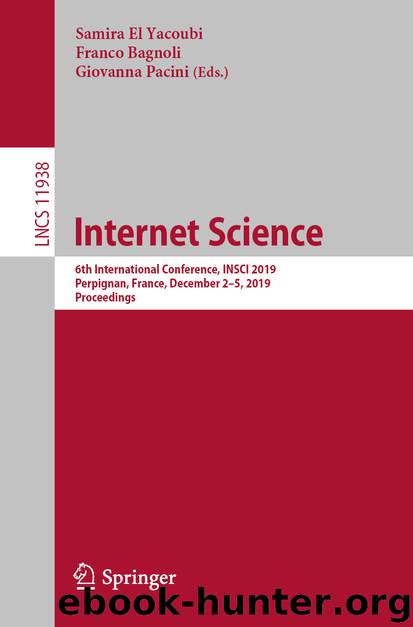Internet Science by Samira El Yacoubi & Franco Bagnoli & Giovanna Pacini

Author:Samira El Yacoubi & Franco Bagnoli & Giovanna Pacini
Language: eng
Format: epub
ISBN: 9783030347703
Publisher: Springer International Publishing
1 Introduction
Collective Intelligence (CI) is an idea found in multiple disciplines such as computer and web science, decision-making, economics, political science, sociology, psychology and even biology [39]. The concept of CI is currently closely connected with the development of ICT networks and entails utilization of interactions between users in online communities to create “added value” based on collective work and cooperation. The authors of this paper are currently involved in the research project “Collective intelligence on the Internet: applications in the public sphere, research methods and models of civic participation”, which aim is a critical review of the CI research methods to examine their suitability for application in the public sphere, that is, among others: in citizen e-participation, in government crowdsourcing, and in direct e-democracy; practical analysis of selected projects related to the use of CI in the public sphere, and finally a theoretical reflection on the subject of existing and possible to implement models of civic participation specific for CI initiatives implemented in the public sphere and using the internet.
The geographical area, on which we consider these issues, is mainly Central and Eastern Europe. This region of the world is currently affected by several social problems - both the new ones, resulting from the contemporary geopolitical conditions: the political crisis in Ukraine and migration connected with it, as well as old ones, derived from the legacy of post-communism: low trust in political institutions and the loosening of social bonds, weakened norms of consensus and agreement, low quality of the public debate [17].
Our widely scoped goal is to answer several questions about the possible impact of the internet-based CI initiatives on the Central and Eastern European public sphere. We consider: whether and how the organization models specific to CI initiatives can help in solving emerging socio-political challenges of this region, among them: problems of social integration, migrations, and citizen participation? What new areas of the public sphere, as well as new methods of deliberation and collective action, can be reached through this?
However, the works described in this paper, focus on a more specific goal: collective intelligence and the geopolitical situation in the Central and Eastern Europe – migrations, conflicts, and social unrest. We assume that a certain type of CI projects implemented in the public sphere can ease the tensions related to these problems: reduce distrust, reduce polarization, and build communities (premises for this hypothesis can be found, among others in: [7, 44, 46]). Therefore we are looking for research methods that could confirm or deny this hypothesis. To be prepared for answering to these research challenges, we went through a critical examination of currently existing methods of researching and analyzing CI on the internet. The scientific literature on this subject has gone through an enormous growth in the last years. Nevertheless, each academic discipline takes its own research approach to the issue of CI and competing terminologies are often used to describe the same questions. For this reason, we were forced to focus our interest on a few selected analytical approaches for more complex analysis.
Download
This site does not store any files on its server. We only index and link to content provided by other sites. Please contact the content providers to delete copyright contents if any and email us, we'll remove relevant links or contents immediately.
Algorithms of the Intelligent Web by Haralambos Marmanis;Dmitry Babenko(17650)
Jquery UI in Action : Master the concepts Of Jquery UI: A Step By Step Approach by ANMOL GOYAL(10070)
Test-Driven Development with Java by Alan Mellor(7755)
Data Augmentation with Python by Duc Haba(7628)
Principles of Data Fabric by Sonia Mezzetta(7403)
Learn Blender Simulations the Right Way by Stephen Pearson(7312)
Microservices with Spring Boot 3 and Spring Cloud by Magnus Larsson(7157)
Hadoop in Practice by Alex Holmes(6704)
RPA Solution Architect's Handbook by Sachin Sahgal(6533)
The Infinite Retina by Robert Scoble Irena Cronin(6241)
Big Data Analysis with Python by Ivan Marin(5959)
Life 3.0: Being Human in the Age of Artificial Intelligence by Tegmark Max(5547)
Pretrain Vision and Large Language Models in Python by Emily Webber(4917)
Infrastructure as Code for Beginners by Russ McKendrick(4677)
Functional Programming in JavaScript by Mantyla Dan(4516)
WordPress Plugin Development Cookbook by Yannick Lefebvre(4413)
The Age of Surveillance Capitalism by Shoshana Zuboff(4275)
Embracing Microservices Design by Ovais Mehboob Ahmed Khan Nabil Siddiqui and Timothy Oleson(4168)
Applied Machine Learning for Healthcare and Life Sciences Using AWS by Ujjwal Ratan(4156)
